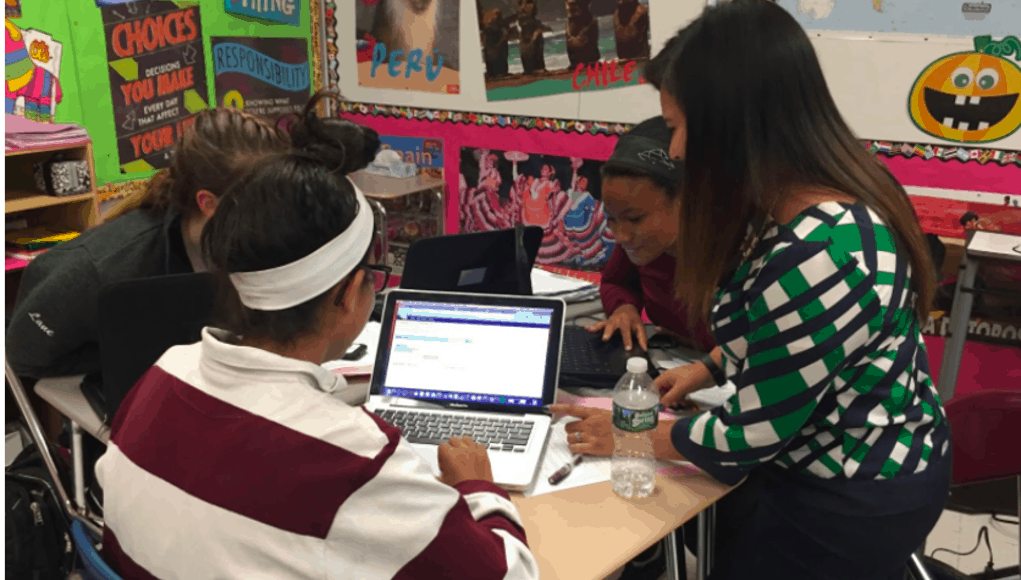Getting Smart Podcast | Competency-Based Blended Language Learning

This podcast series on language learning features voices of EdLeaders, educators and students. The intent of the series is to highlight the ideas of language experts and great examples of language teaching and learning across the country. Getting Smart believes online language learning can be used to enhance or complement face-to-face instruction. This podcast series is sponsored by Rosetta Stone Education. See the bottom of this blog for more.
Personalized and competency-based environments have shown to help individual students meet their respective academic goals. Research is showing this to be true across core academic areas. Like most subjects, students also benefit from personalized and competency-based language learning.
Language teachers across the country have been ahead of the curve when it comes to this type of language teaching and learning, as many already focus on assessing progress towards language proficiencies. The widely accepted and used performance indicators from the National Council of State Supervisors and the American Council for Teaching of Foreign Languages (ACTFL) are proficiency-based. The Can-Do Statements, “help learners identify what they need to do to function at a specific level of proficiency” and serve as an invaluable tool to teachers and students. Educators debate the similarities and differences between competency-based and proficiency-based, but at the core both entail a focus on demonstration of a set of skills. The indicators along with the ACTFL World-Readiness Standards for Learning Languages that include standards for Communication, Cultures, Connections, Comparisons and Communities, serve as exemplars for other subjects and fields looking to innovate and rethink their approaches.
Jennie Taranovich, language teacher from Bethel, CT, is one language teacher that realized she needed more time to work with students individually and to focus on language competencies. After 11 years of teaching, she recently has embraced a more blended, personalized and competency-based way of teaching and has found that her students are thriving. She uses the ACTFL Standards and Can-Do performance indicators to guide learning experiences in her classroom, which includes both online and face-to-face experiences.
Students were not interested in taking language and over 25% were not on track to pass her course about halfway through. Now, since she and her team have shifted to more a personalized, competency-based and blended environment, students are engaged and only 2% are considered at-risk of not passing.
However, Jennie says this 2% isn’t a huge concern anymore because by moving students through competencies, they can retake and redo assignments as much as they want, so that by the end of the course ALL students will pass. In fact, some students have taken other World Language classes online in other languages than Spanish in addition to their regular course.
Jennie shares that she, as well as parents, have more access than ever to what students are doing and how they are progressing. While it definitely takes time to adjust to this type of teaching, she says the rewards are well worth the investment of time upfront. She advocated making this change because she knew how she was teaching before wasn’t working for students. See some of the reasons she shared at a school board meeting for the shift:
Why Digital World Language?
- Personalized, competency-based learning
- Self-paced environment in a safe learning environment
- Opportunity to advance
- Students take ownership of their own learning
- Student-centered/Teacher facilitator
- Anytime, anywhere learning
- Class size can be increased
- Allows us to offer a French 1 alternative (a course that was cut this year)
- We can open the doors to many languages that we could never have offered otherwise
In the podcast, we hear more from Jennie about how she is innovating the language classroom.
This podcast series is sponsored by Rosetta Stone Education. Interviewees were not compensated for their participation. The Rosetta Stone® Language Learning Suite for K12 provides flexible e-learning solutions that are easily integrated with the teacher’s in-class instruction. Their solutions are designed for all proficiency levels to fit your students‘ learning needs. For more, visit Rosetta Stone.com or see the Get Language Ready site.
For more, see:
- Getting Smart Podcast | Global Competency in Kentucky
- Getting Smart Podcast | Language Learning Opens Doors to Opportunity in Work and Life
- All Children Should be Bilingual: The Dual Language Economic Imperative
- Online Language Learning Toolkit
- Blended Language Learning Toolkit: Classroom-Based Implementation
Stay in-the-know with all things EdTech and innovations in learning by signing up to receive the weekly Smart Update. This post includes mentions of a Getting Smart partner. For a full list of partners, affiliate organizations and all other disclosures please see our Partner page.







0 Comments
Leave a Comment
Your email address will not be published. All fields are required.